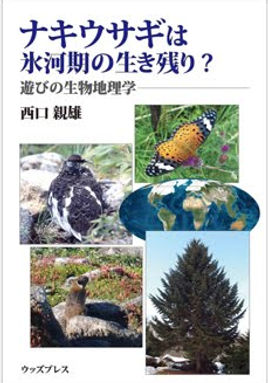Are pikas a survivor of the Ice Age? -Play biogeography

Click here for how to purchase
"Pikas and Picea glehnii were good friends."
When I encounter such phrases everywhere, I feel very happy.
This is because the familiarity will spring up at once.
The existence of insects, birds, beasts and plants that we have never been aware of until now comes to life.
The landscape is imagined with this casual phrase.
You will be drawn into the world of talk in an instant.
In addition to the title, all 17 volumes.
"Natural history essay" that weaves free ideas and reasoning
Table of contents (details omitted)
Geological time classification table
Color frontispiece
Prologue Rhodinia Fuga Story-Connecting East Tibet and Japan-
The road to Japan in Rhodinia fuga
1 Disjunct distribution of Rhodinia fuga -East Tibet and Japan-
2 Tibetan Rhodinia fuga prey plant -Inuzakura (Takayama Elementary School)-
3 The road where Rhodinia fuga came -From East Tibet to Japan-
Four Transition of prey plants of Rhodinia fuga
Rhodinia fuga cocoon draining technology
1 Water hole at the end of the cocoon
2 Lotus root-like pores in the fiber membrane
3 The cocoons from East Tibet also had a fibrous film
Four Consideration (1) -Why does the cocoon of Rhodinia fuga need a fiber film?-
Five Consideration (2) -Why is the cocoon of Rhodinia fuga green?-
I Tree History-From the Cretaceous to the Quaternary Glaces-
Gondwana Trees-Kauri, Minami Hinoki, Minami Beech, Baobab, Eucalyptus-
1 Kauri (Araucariaceae) and Yellowwood family
2 Japanese cypress (Cupressaceae)
3 Minamibuna (Minamibuna family)
Four Baobab (Bombacaceae)
Five Eucalyptus and marsupials
Transition of the tree fauna of the Japanese archipelago-from the Tertiary to the Quaternary-
1 Paleogene trees-the Japanese archipelago is part of the continent-
2 Neogene trees
3 Quaternary plants (2 million years ago – this world)
II Formation of the multi-island sea in Southeast Asia-Division of coastlines on both the southern and northern continents-
Black Woodpecker and Birdwing Ageha
1 Distribution of bluebottle
2 Distribution of common jay
3 Wallace line
Four Think of the Wallace Line from woodpeckers
Five Separation order of Southeast Asian islands from continents-from woodpecker information-
6 Southeast Asian skerry coast formation
7 Setting the Black Woodpecker Line-The First Coastline of the Northern Continent-
8 Gondwana butterflies
III Tertiary living fossils
Ezo spruce-grab prosperity by updating fallen trees-
1 Spruce and musical instruments
2 Spruce with a square cross section on the leaves
3 Spruce with flat leaf cross-section-a surviving species of the Tertiary period-
Four World distribution of flat leaf spruce
Five Causes of the decline of flat leaf spruce
6 Prosperity of spruce-Development of fallen tree renewal technology-
7 Spruce-Honshu subspecies of spruce-
Pika-Survival of the Ice Age? -
1 Picea glehnii and pika
2 Survival of the Ice Age?
3 Another interpretation of "living fossils"
Four Glacial "left-behind" population
Five Glacial "survival" population
6 Why the surviving species still survive
7 The genus Pika is a surviving species of the Tertiary period
Dormouse-Escape to the world of trees-
1 Flower beast
2 Dormouse vs. Small Japanese Field Mouse
3 The road where Japanese Yamane came
Four Dendrology of azaleas
Five Reasons for the diversification of azaleas-It's been a long time since I came to Japan-
6 Purple palm azalea group
Pursuing the roots of Japanese larch-the ancestor is Himalayan cedar-
1 Examine the resistance of coniferous seedlings
2 Where did Japanese larch come from?
3 Larch in the world
Four Larch and Himalayan cedar are close relatives
Five Cedar genus (Himalayan cedar)
6 Himalayan orogeny
7 Expanding the distribution of the original larch
8 Larix gmelin crossing the Bering Strait (overpass)
IV Developed in the Tertiary
Beech and Sasa-Great development in Japan-
…… 《Beech-corresponding to heavy snowfall-》 ……
1 Birth of the Japanese archipelago
2 Genealogy of old-fashioned beech-from polar beech to beech-
3 Birth of evolutionary beech
Four Beech larvae-different species of the same genus are in Japan and Europe-
Five Evolved beech goes to the beach
6 Evolved beech to Japan
…… 《Sasa-Greening the disaster archipelago-》 ……
1 Sasa's hometown
2 Adapted to the Japanese climate
3 Animals supported by Sasa
A winter scale born in Japan, traveling around the world
1 Erannis golda-Eat a wide range of hardwoods such as beech and quercus crispula-
2 Ochabanefyuedashaku (Erannis defoliaria) -Eating fir-
3 Consideration (1): Ecological comparison between the German cockroach and the German cockroach
Four Consideration (2): Hypothesis about the birth of Ochabanefyuedashaku
Five Consideration ③: From Japan to Europe-From fir to hardwood-
V Quaternary Casebook-Ice Age and Post-Glacial Period-
Grouse and pine grosbeak
…… 《Grouse》 ……
1 Grouse population drastically reduced-from a newspaper article-
2 Grouse lifestyle
3 World distribution of grouse
Four Birth of grouse seeds and variants
…… 《Ginzan Machiko of Daisetsuzan》 ……
1 Asahidake trekking
2 Pine grosbeak grabs happiness in Japan
3 Tundra wilderness bird
Four The strong enemy is Iska
Five Hokkaido is a paradise of pine grosbeaks
Jungle Crow Meets Humans-In Tropical Asia-
1 Crow using tools
2 Crow making tools
3 Crow beak shape
Four Evolution of the crow family
Five Encounter between Jungle Crow and Human
6 Encounter of Jungle Crow and Carrion Crow